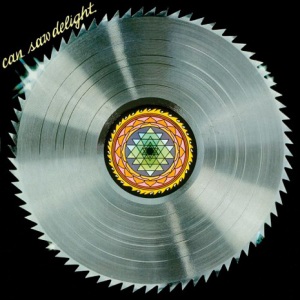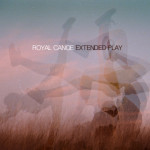As part of Virgin label’s 40th anniversary celebrations I take a special look back at the krautrock years, with purviews of some iconic albums from Can, Faust and Tangerine Dream.
Continuing with the venerated sonic magi of Cologne, Can, I move from their shaky glam-infested debut for the label, Landed, onto the often-overlooked ‘world music’ suite Saw Delight. A sideways promotion to the Virgin imprint Harvest, and with two more albums of mixed quality – one the collection of cutting room floor jams, sketches and unfruitful ideas Limited Edition, and the other Flow Motion – under their belt, the next project would see the ex-Traffic duo of percussionist Rosko Gee and bassist Reebop Kwaku Baah join the ranks as the group’s totem bass-player, arranger, producer Holger Czukay moved to transmitter and radio wave manipulation.
Omitted from the bands discography of highlights, the albums mixed quintet of rhythmic exercises is given a timely appraisal from your humble author.

Traversing influences from around the globe, the ethnography alchemists Can always effectively absorbed the traditional and authentic music of multiple cultures, including the Middle East, Far East and Turkey. However it wasn’t until the release of 1977’s Saw Delight LP that the group found themselves lauded as so-called ‘world music’ pioneers. In truth this five track assiduous collection of Afro-beat and South American imbued songs does sound like the precursor to the 80s explosion in ethnically traditional music; inspiring artists as diverse as Paul Simon and PiL along the way.
Much of Can’s later work is often dismissed or omitted from view, with even the bands apologists steering way clear. Perhaps this can be attributed to the fact that their last couple of albums proved disappointing, the strange proto-glam of Landed and the more disco-esque reggae of the conventional Flow Motion – which spawned their most commercial hit ‘I Want More’ – did little to ingratiate die-hard fans to the cause, with many believing they’d lost their experimental edge. Fortunately Saw Delight placed them back on track for a momentary epoch, mainly due to the inclusion of former Traffic bass player Rosko Gee, and percussionist Reebop Kwaku Baah, who added a touch of both African grooves and Caribbean coolness to the Teutonic mix.
Rosko’s arrival in particular changed the dynamics, allowing Holger Czukay to step away from the bass guitar and engineering/production duties to concentrate on producing interloping and spontaneous sound effects. Interacting with telephone calls and various radio transmissions, Czukay created the technique of using a Morse code switch to relay the signal and tap out these often-strange sound bite samples. Vocals this time were shared by everyone, with Rosko pitching in with lyrics to ‘Call Me’ and collaborator Peter Gilmour (journalist friend of the band who co-wrote tracks on their last two albums) supplying words for ‘Don’t Say No’ and ‘Fly By Night’.
The music itself gyrates to a disco and funk fueled Afro-beat rhythm, sauntering along most of the time in a kind of infectiously serene fashion. Opening song ‘Don’t Say No’ springs into action, settling quite rapidly into a taut rhythmic and containable conducted feel-good jam. Oscillating and accelerating keyboard waves of sound shuffle around the wispy delivered vocals that prompt us to, “Do what you feel, what you need to do” in a relaxed Jamaican fashion. ‘Sunshine Day And Night’ features a rallying conga intro, courtesy of Reebop, whose Ghanaian ancestry comes in quite handy on this West African flavoured jam. Czukay mingles at this point, shoehorning in waves of operator dialled phone conversations and snatches of transistor radio shows, whilst Irmin Schmidt emits a smog thick blanket of effects via his infamous Alpha 77 plaything.
Over on the flip side we find the 15-minute mini-opus ‘Animal Waves’, a moody piece that mixes elements of mysterious whispery windswept atmospherics with a more stirring and emotive melodic soundtrack. Touches of Cuban percussive grooves and African bubbling broody basslines pull at this sad and forlorn instrumental that is full of grandiose cinemascope and erudite musical charm. Occasionally just to let us know they’re human, Rosko may drop a series of bass notes in the wrong place or an odd guitar riff goes awry. One of the more beguiling, if not strange, tracks is the sultry Barry White school of soulful disco, ‘Fly By Night’, a peculiar sounding funky balled that is unlike anything the group had ever recorded or were likely to conceive repeating.
Throughout this LP, the usually prominent and leading protagonist of the group, Michael Karoli, seems somehow restrained, playing the role of a drifter, though always managing to add desideratum moments of floating ark like celestial guitar licks at the right time. Also drumming prodigal magi Jaki Liebezeit moves to the sides, remaining an anchor, but reining in his usual freewheeling floor show of elaborate rolls, instead reverting to his machine accurate timings and leaving enough space for the percussion of Reebop.
Can’s most accomplished album of the later 70s, has more then enough interesting and majestic moments to make this a must have addition to any self-respecting record collection, regardless of nay-sayers.




